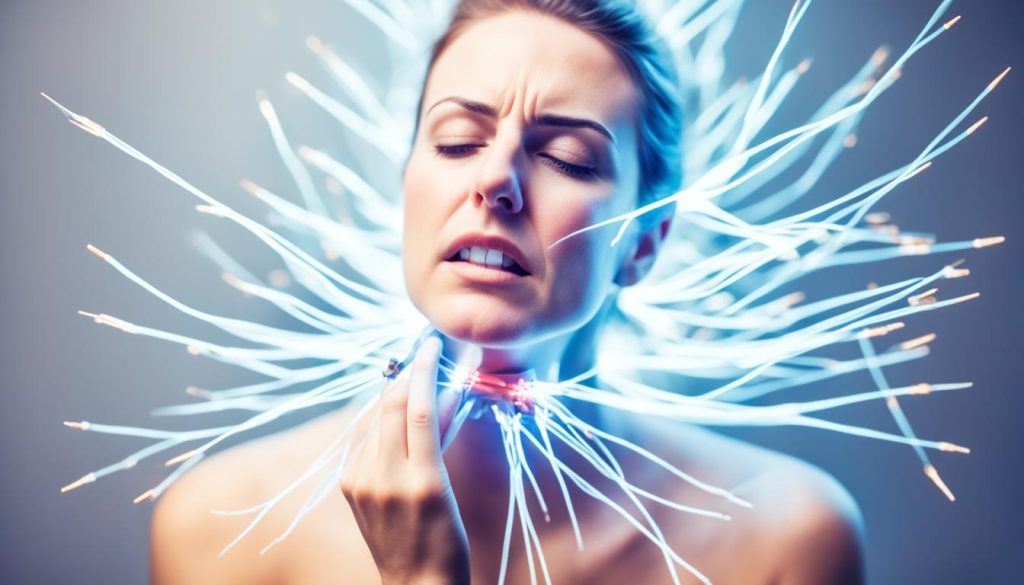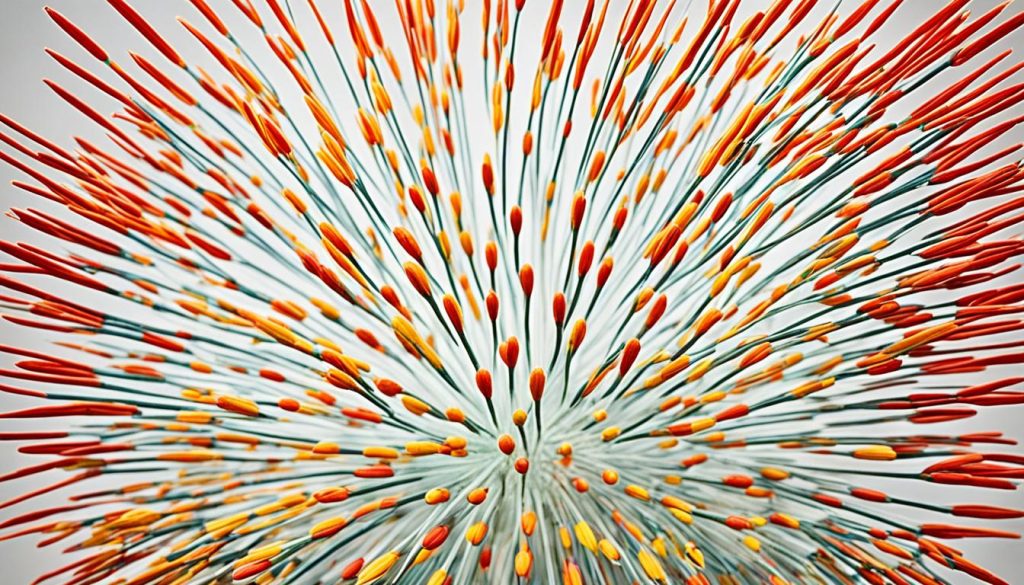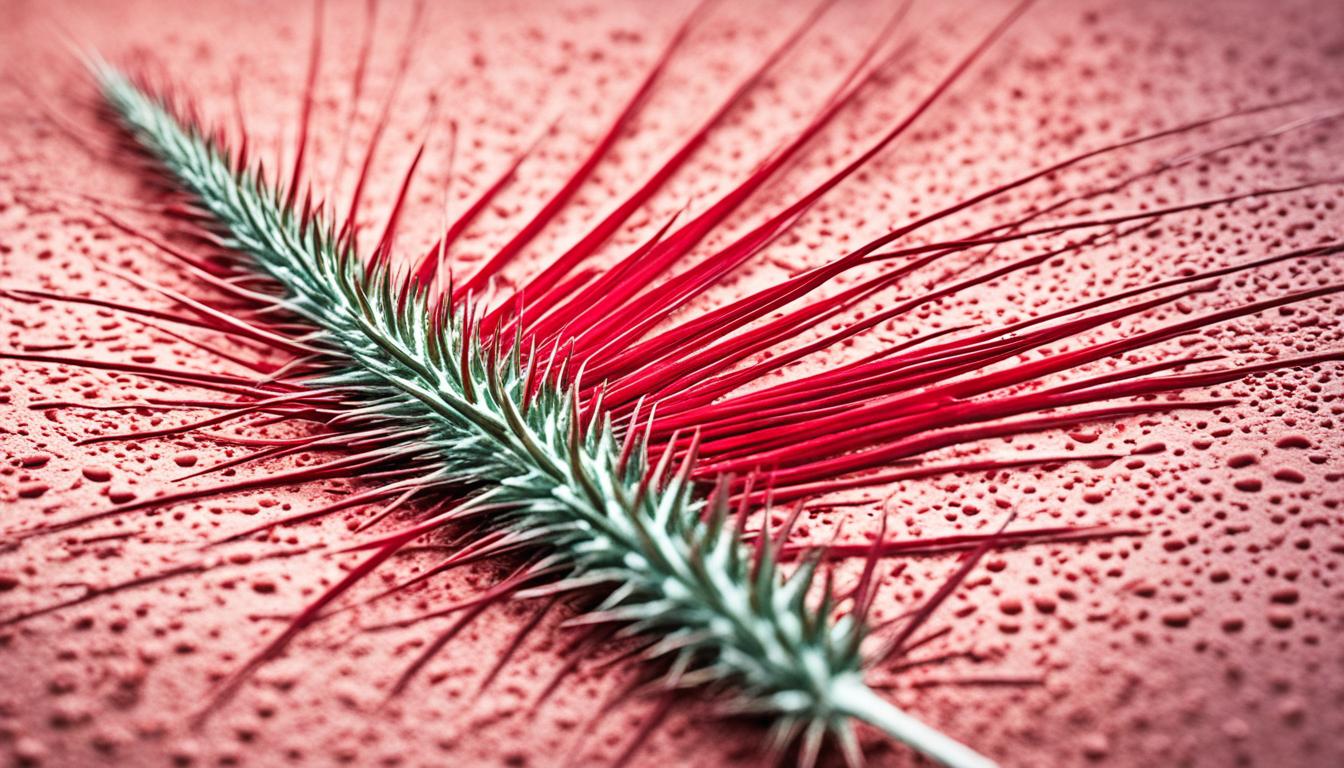Experiencing an uncomfortable sensation of needles poking your body can be alarming and concerning. This pins and needles sensation, known as paresthesias, can have various causes and underlying factors. Understanding why this sensation occurs and when to seek medical attention is important for your health and well-being.
In this article, we will explore the causes, contributing factors, and sensations associated with the needle-like feeling. We will also discuss when it is necessary to consult a healthcare professional and what treatment options may be available to alleviate this discomfort. By gaining a deeper understanding of the pins and needles sensation, you can better address and manage this condition.
Why Do I Feel Like Needles Are Poking My Body?
Experiencing a needle-like sensation in the body can be a distressing and uncomfortable experience. This phenomenon, also known as paresthesia, can occur due to various causes. Understanding these causes is crucial in order to address the underlying issue effectively.
Pressure on Specific Areas of the Body
One of the common causes of the needle-like sensation is the compression of nerves in specific areas of the body. Sitting or crossing legs for extended periods can exert pressure on nerves, leading to paresthesia. This can result in the tingling needles on the skin and a sharp prickling feeling throughout the body.
Medications and Supplements
Certain medications used to treat conditions such as HIV and cancer can affect nerve function, causing a tingling sensation akin to sharp needles. Additionally, supplements like beta-alanine, commonly used by athletes, can have similar effects on nerve sensitivity, resulting in the prickling feeling on the skin.
Underlying Health Conditions
Several underlying health conditions can contribute to the sensation of needles poking the body. Stroke, trauma, and vitamin B12 deficiency can affect nerve function and lead to paresthesia. Furthermore, conditions like multiple sclerosis and diabetes can also cause tingling sensations, similar to the feeling of needles.
To better understand the causes of the needle-like sensation, it is important to consult a healthcare professional who can provide an accurate diagnosis and appropriate treatment based on the individual’s specific circumstances.

Having a comprehensive understanding of the causes of the needle-like sensation can empower individuals to seek proper medical attention and address any underlying health issues effectively. By addressing the root cause of the sensation, it is possible to alleviate discomfort and prevent potential complications.
Other Contributing Factors to Needle-Like Sensation
In addition to the previously mentioned causes, there are several other factors that can contribute to the sensation of needles all over the body or a prickling sensation in the body. These factors may lead to symptoms of needle-like pain and discomfort:
- Panic Attacks: Individuals who experience panic attacks may also experience paresthesia as a result of the intense physical and emotional stress experienced during an attack.
- Alcohol Abuse: Excessive alcohol consumption can damage peripheral nerves and lead to neuropathy, resulting in the sensation of needles poking the body.
- Tunnel Syndromes: Conditions such as carpal tunnel syndrome, cubital tunnel syndrome, or tarsal tunnel syndrome can compress nerves and cause paresthesia in the affected areas.
- Sciatica: Compression or irritation of the sciatic nerve can cause pain, numbness, and a prickling sensation down the leg.
- Thoracic Outlet Syndrome: This condition occurs when nerves and blood vessels in the thoracic outlet (area between the neck and shoulder) are compressed, resulting in paresthesia in the upper extremities.
- Autoimmune Conditions: Certain autoimmune conditions, such as Sjogren’s syndrome, systemic sclerosis, vasculitis, rheumatoid arthritis, and lupus, can cause inflammation and damage to nerves, leading to the sensation of needles poking the body.
- Encephalitis: Inflammation of the brain can result in neurological symptoms, including paresthesia.
- Lyme Disease: This tick-borne illness can lead to various neurological symptoms, including paresthesia.
- HIV: The human immunodeficiency virus (HIV) can cause peripheral neuropathy, resulting in abnormal sensations in the limbs, including a prickling sensation.
- Heavy Metal Toxicity: Exposure to certain heavy metals, such as lead, mercury, or arsenic, can cause nerve damage and paresthesia.
- Tumors: In some cases, tumors can put pressure on nerves, leading to paresthesia in the affected area or throughout the body.
It is important to note that while the pins and needles sensation itself is usually not dangerous, it may indicate underlying nerve or artery damage. If you experience persistent symptoms or are concerned about the prickling sensation in your body, it is advisable to consult a healthcare professional for a proper evaluation and diagnosis.

By identifying and understanding the various contributing factors to the needle-like sensation, you can work towards finding appropriate treatment options and managing any underlying conditions. Consultation with a healthcare professional will help determine the best course of action for relieving the discomfort and addressing the specific causes of the prickling sensation in your body.
Sensation of Pins and Needles
The pins and needles sensation can feel like small pins and needles poking the area. It is often described as a tingling numbness and can also be accompanied by burning, prickling, itching, or crawling sensations. In some cases, the affected body part may feel like it has “fallen asleep” or completely numb.
This tingling sensation is commonly experienced in various situations. Some people may feel pins and needles after sitting or standing in the same position for a prolonged period, which can put pressure on the nerves and cause temporary paresthesia. Others may experience it due to poor circulation or nerve compression resulting from conditions such as carpal tunnel syndrome or sciatica.
The pins and needles feeling can also occur as a result of certain medical treatments or conditions. For example, acupuncture is known to stimulate specific points on the body, resulting in a tingling sensation that is often described as pins and needles. Additionally, conditions like diabetes or vitamin B12 deficiency can lead to nerve damage, causing the tingling sensation in different parts of the body.
If you’re experiencing an acupuncture sensation, tingling sensation, or pins and needles feeling, it’s important to pay attention to the duration and frequency of the sensation. If the tingling sensation persists for an extended period or is accompanied by other concerning symptoms, it may be wise to seek medical attention to identify any underlying causes and receive appropriate treatment.
When to Seek Medical Attention?
If you’re experiencing the uncomfortable sensation of feeling like needles are poking your body, there are certain instances where it is recommended to seek medical attention to address and alleviate this symptom.
If simple repositioning or changing body positions does not provide relief from the pins and needles sensation, it is advisable to consult a healthcare professional for further evaluation and guidance. Persistent or widespread paresthesia, particularly when accompanied by additional concerning symptoms such as fever, weakness, unintentional weight loss, or changes in vision or speech, should be evaluated by a healthcare provider.
Treatment options for managing this needle-like sensation depend on the underlying cause and may include addressing the specific condition, adopting lifestyle modifications, taking prescribed medications, or undergoing physical therapy.
Treatments for Needle-Like Sensation
When seeking medical attention for needle-like sensations, the healthcare professional will assess your individual situation and recommend appropriate treatment strategies. Some common treatments for needle-like sensations include:
- Addressing the underlying condition: In many cases, treating the underlying condition that is causing the pin and needles sensation can effectively relieve this symptom. This may involve managing conditions such as vitamin deficiencies, diabetes, or autoimmune disorders through medication, lifestyle changes, or other interventions.
- Lifestyle modifications: Making certain lifestyle changes can help reduce the occurrence and intensity of needle-like sensations. These modifications may include avoiding prolonged pressure on specific body parts, maintaining a healthy weight, managing stress levels, and adopting exercises or stretches that promote nerve health.
- Medications: Depending on the underlying cause of the needle-like sensation, medications may be prescribed to manage symptoms and provide relief. This may include pain relievers, nerve-stabilizing medications, or anti-inflammatory drugs.
- Physical therapy: In some cases, physical therapy may be recommended to improve nerve function and reduce the sensation of needles poking the body. Physical therapists can develop customized exercise programs to target specific affected areas and improve overall mobility and nerve health.
Remember, each case is unique, and it’s crucial to consult with a healthcare professional to receive an accurate diagnosis and personalized treatment plan to address your individual needs.

Image: A person receiving physical therapy for nerve-related symptoms.
Recapping the Pins and Needles Sensation
The pins and needles sensation, also known as paresthesia, can be a distressing experience characterized by a tingling or prickling feeling in various parts of the body. This sensation often feels like sharp jolts and can be accompanied by numbness, burning, or itching. While it can be unsettling, the pins and needles sensation is usually not dangerous on its own.
However, it is essential to pay attention to the timing and accompanying symptoms of the sensation. If you frequently experience nerve pain or notice sharp jolts in your body along with the pins and needles sensation, further medical evaluation may be necessary to identify any underlying causes or potential complications.
There are various possible reasons for experiencing this sensation. Nerve irritation is a common cause, which can result from pressure on the nerves due to poor posture, injuries, or medical conditions like carpal tunnel syndrome or sciatica. Additionally, underlying health conditions such as neuropathy, diabetes, multiple sclerosis, or vitamin B12 deficiency can contribute to the pins and needles sensation.
It is essential to seek medical guidance if you are concerned about the frequency or severity of the pins and needles sensation. A healthcare professional can help identify the underlying cause and recommend appropriate treatment options, which may include addressing any underlying health conditions, physical therapy, medications, or lifestyle modifications.
Remember, proper medical evaluation is crucial in understanding and managing the pins and needles sensation to ensure your well-being and prevent any potential complications.

| Common Causes of Pins and Needles Sensation | Symptoms to Look Out For |
|---|---|
|
|
Conclusion
The pins and needles sensation can be an uncomfortable and sometimes concerning experience. It is important to understand the potential causes behind this sensation and seek appropriate medical attention when necessary. By addressing the underlying factors, you can alleviate the discomfort and potentially prevent any complications.
If you are experiencing persistent or widespread paresthesia, it is recommended to consult with a healthcare professional. They can assess your symptoms, conduct tests if needed, and determine the best course of action for your specific situation. Whether it’s modifying your lifestyle, taking medications, or undergoing physical therapy, seeking professional guidance will help in managing the pins and needles sensation effectively.
Remember, while the sensation itself is usually not dangerous, it may indicate an underlying health issue. By taking proactive steps and working with healthcare professionals, you can regain comfort and ensure your well-being.




